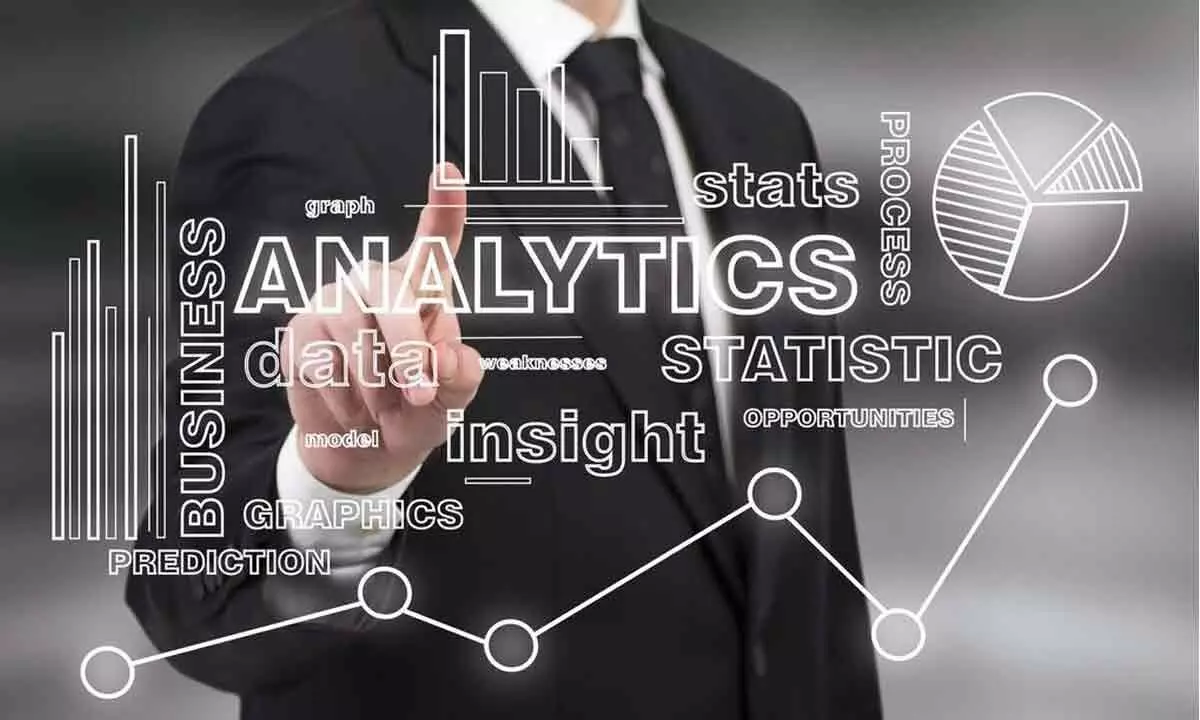Live
- PM praises city-based NGO for promoting libraries
- Odisha police rescue ‘trafficked’ Bangla girl
- iPhone 16 Plus Now at Rs. 2,000 Discount on Amazon – Get It Today
- How Technology is Shaping Global Connectivity and Enhancing Security
- Dy CM directs officials to collect all critical info on caste census
- Naga Chaitanya Opens Up About His Wedding Plans with Sobhita Dhulipala
- ‘NC24’ First Look Poster: Naga Chaitanya’s Next Promises Thrills and Mythology
- Rumors Heat Up as Vijay and Rashmika Enjoy a Cozy Meal Together
- 67th annual day celebrations held at IRISET
- Actor Ali Receives Legal Notice Over Unauthorized Construction at Vikarabad Farmhouse
Just In
Path to successful digital, professional leap at work


“What big data represents is an opportunity; an opportunity for actionable insight, an opportunity to create value, an opportunity to effect relevant and profitable organizational change” – CIS Wired.
"What big data represents is an opportunity; an opportunity for actionable insight, an opportunity to create value, an opportunity to effect relevant and profitable organizational change" – CIS Wired.
With big transformations recalibrating the world of work in recent times, it is reasonable to ask, "What is the future of work?" Marked by hybrid models featuring the office and work-from-home in tune alongside unprecedented digitalization, the future of work looks increasingly driven by technology and data. While the deployment of technology has been widely talked about, the latter has not garnered the same degree of conversation. Rick Toepfer remarks that every day, the business world creates more than 2.5 quintillion bytes of data. Yet, most of the data generated is unstructured and cannot be acted upon. To galvanize work in the future, the pressing necessity is to make data effective, on a scale as large as possible.
As Forbes notes, Forrester reports 74 per cent of firms say they want to be "data-driven," but only 29 per cent are actually successful at connecting analytics to action. Actionable insights appear to be the missing link for companies that want to drive business outcomes from their data. Simply put, actionable data is information that has undergone processing and analysis and is available in a comprehensive way. It endows the entities engaging with it, the ability to assess performance, recognize problems and make the most of opportunities. Working with actionable information provides a competitive advantage, a window to manage sales and customer relations, optimize teamwork, take care of supply and inventory and collect substantial evidence of performance or the lack of it.
For instance, if you're running a restaurant, you might have records of food orders but the data in its raw form affords little window for growth and transformation. On the other hand, analysis can turn this data into a meaningful resource which can be utilized for a wide possibility of strides. Once you know what orders are the most popular and which are your most loyal customers, you can observe trends to introduce new options on the menus and expand delivery to areas with a stable clientele. The same is true for the usual workplace and administrative regimes. Processed information provides avenues for self-assessments, expansion and optimal delivery of services. Very importantly, it is indispensable in a crisis, as India's data-driven response to Covid-19 demonstrates.
Yet, there is a lack of actionable information plaguing our everyday productivity and a data-fuelled figure cannot materialize in such a circumstance. A dearth of actionable information is premised upon several factors. Firstly, the 'big' raw data collected is marked with problems of its own, including poor and incomplete data entry, unstandardised formats and indicators. The second problem is the existence of a vast pool of under-processed and misleading data, which needs appraisal and processing. These occur because of a lack of infrastructural support and adequate training in digital and analytical skills, which can be taken care of through the right investments in capacity building and skilling.
However, another problem, as expert AbhirupBhunia remarks, which is bigger and more difficult to solve, pertains to behaviour and capacity of administrative staff across levels. Gaps in data recording, checks and validation of the recorded data and an aggregation of the data occurs at all levels, ranging from lower levels to upper supervisory echelons. When the data itself is faulty, aggregation and analytics are unproductive. Thus, a drive to sensitize workers towards vigilant and sincere data collection and cataloguing is necessary. In light of all of these problems, every company needs to have an analytics budget, the funds necessary for running an integrated analytical framework.
Most importantly, for the future, we need technology to derive from, participate in and be in sync with the actionable insights we have developed and aim to develop. Fabio Caversan, Vice President of Digital Business and Innovation at Stefanini remarks that the power and possibilities new technologies unlock are based on one key unifying element: data. The ability to gather, manage, analyze and utilize vast amounts of data - discovering new connections and gleaning new insights - is a true game-changer across a wide range of applications. In fact, one of the newest exciting data analytics frontiers is where new artificial intelligence tools are being utilized to supercharge data analysis and identify needles of insight in the vast haystack of raw data. This synergy between actionable information and technology is an essential component of the future of work we envision.
To sum up, the pathway to a glorious, successful digital and professional leap for work is fidelity to actionable data.
Extracting optimum value from information is the zeitgeist the professional world needs and must actualize for an extraordinary tomorrow.
(The author is Chief Impact Officer at Recykal Foundation)

© 2024 Hyderabad Media House Limited/The Hans India. All rights reserved. Powered by hocalwire.com






